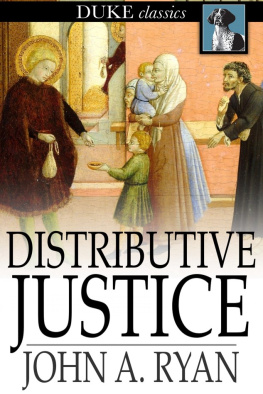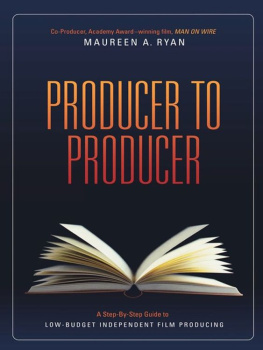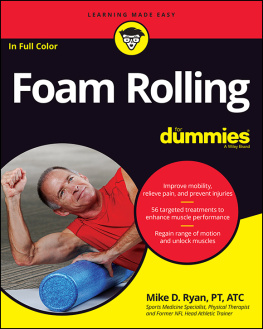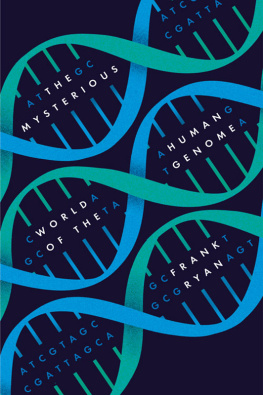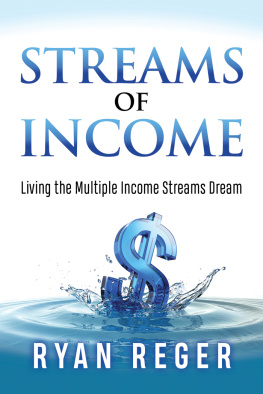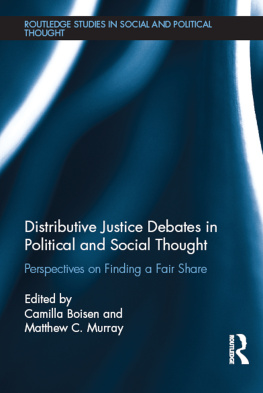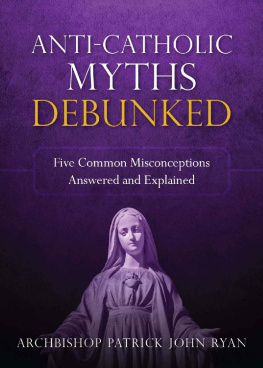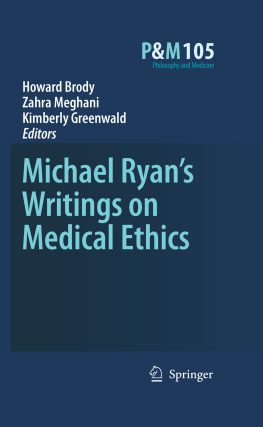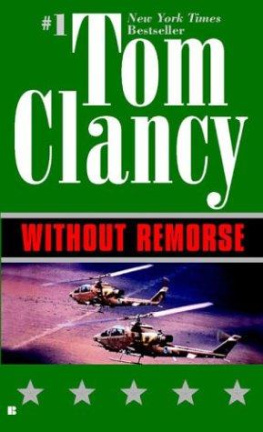DISTRIBUTIVE JUSTICE
THE RIGHT AND WRONG OF OUR PRESENT DISTRIBUTION OF WEALTH
* * *
JOHN A. RYAN
*
Distributive Justice
The Right and Wrong of Our Present Distribution of Wealth
First published in 1916
ISBN 978-1-62013-659-1
Duke Classics
2014 Duke Classics and its licensors. All rights reserved.
While every effort has been used to ensure the accuracy and reliability of the information contained in this edition, Duke Classics does not assume liability or responsibility for any errors or omissions in this book. Duke Classics does not accept responsibility for loss suffered as a result of reliance upon the accuracy or currency of information contained in this book.
Contents
*
*
To
ARCHBISHOP IRELAND
IN
ADMIRATION AND GRATITUDE
Preface
*
Five of the nine members of the late Federal Commission on IndustrialRelations united in the declaration that the first cause of industrialunrest is, "unjust distribution of wealth and income." In allprobability this judgment is shared by the majority of the Americanpeople. Regarding the precise nature and extent of the injustice,however, there is no such preponderance of opinion. Even the makers ofethical and economic treatises fail to give us anything like uniformor definite pronouncements concerning the moral defects of the presentdistribution. While the Socialists and the Single Taxers aresufficiently positive in their statements, they form only a smallportion of the total population, and include only an insignificantfraction of the recognised authorities on either ethics or economics.
The volume in hand represents an attempt to discuss systematically andcomprehensively the justice of the processes by which the product ofindustry is distributed. Inasmuch as the product is actuallyapportioned among landowners, capitalists, business men, andlabourers, the moral aspects of the distribution are studied withreference to these four classes. While their rights and obligationsform the main subject of the book, the effort is also made to proposereforms that would remove the principal defects of the present systemand bring about a larger measure of justice.
Many treatises have been written concerning the morality of one orother element or section of the distributive process; for example,wages, interest, monopoly, the land question; but, so far as theauthor knows, no attempt has hitherto been made to discuss the moralaspects of the entire process in all its parts. At least, no such taskhas been undertaken by any one who believes that the existing economicsystem is not inherently unjust. That the present essay in this fieldfalls far short of adequate achievement the author fully realises, buthe is sustained by the hope that it will provoke discussion, and movesome more competent person to till the same field in a more thoroughand fruitful way.
JOHN A. RYAN.
The Catholic University of America,
Washington, D. C., June 14, 1916.
Introductory Chapter - The Elements and Scope of the Problem
*
Distributive justice is primarily a problem of incomes rather than ofpossessions. It is not immediately concerned with John Brown's railwaystock, John White's house, or John Smith's automobile. It deals withthe morality of such possessions only indirectly and under one aspect;that is, in so far as they have been acquired through income.Moreover, it deals only with those incomes that are derived fromparticipation in the process of production. For example; it considersthe labourer's wages, but not the subsidies that he may receivethrough charity or friendship. Its province is not the distribution ofall the goods of the country among all the people of the country, butonly the distribution of the products of industry among the classesthat have taken part in the making of these products.
These classes are four, designated as landowners, capitalists,undertakers or business men, and labourers or wage earners. Theindividual member of each class is an agent of production, while theinstrument or energy that he owns and contributes is a factor ofproduction. Thus, the landowner is an agent of production because hecontributes to the productive process the factor known as land, andthe capitalist is an agent of production because he contributes thefactor known as capital; while the business man and the labourer areagents not only in the sense that they contribute factors to theprocess, but in the very special sense that their contributionsinvolve the continuous expenditure of human energy. Now the product ofindustry is distributed among these four classes precisely becausethey are agents of production; that is because they own and put at thedisposal of industry the indispensable factors of production. We saythat the agents of production "put the factors of production at thedisposal of industry," rather than "exercise or operate the factors,"because neither the landowner nor the capitalist, as such, expendcontinuous energy in the productive process. All that is necessary toenforce a claim upon the product is to contribute an instrument orfactor without which production cannot be carried on.
The product distributed in any country during a single year isvariously described by economists as the national product, thenational income, the national dividend. It consists not merely ofmaterial goods, such as houses, food, clothing, and automobiles, butalso of those non-material goods known as services. Such are the tasksperformed by the domestic servant, the barber, the chauffeur, thepublic official, the physician, the teacher; or any other personalservice "that is valued, as material commodities are valued, accordingto their selling prices." Even the services of the clergyman areincluded in the national income or product, since they are paid forand form a part of the annual supply of good things produced anddistributed within the country. In the language of the economist,anything that satisfies a human want is a utility, and forms part ofthe national wealth; hence there can be no sufficient reason forexcluding from the national income goods which minister to spiritualor intellectual wants. The services of the clergyman, the actor, theauthor, the painter, and the physician are quite as much a part of theutilities of life as the services of the cook, the chambermaid, or thebarber; and all are as clearly utilities as bread, hats, houses, orany other material thing. In a general way, therefore, we say that thenational product which is available for distribution among thedifferent productive classes comprises all the utilities, materialand non-material, that are produced through human agents and satisfyhuman desires.
In the great majority of instances the product is not distributed inkind. The wheat produced on a given farm is not directly apportionedamong the farmers, labourers, and landowners that have co-operated inits production; nor are the shoes turned out by a given factorydivided among the co-operating labourers and capitalists; and it isobvious that personal services cannot be returned to the persons thathave rendered them. Cases of partial direct distribution do, indeed,occur; as when the tenant takes two-thirds and the landowner one-thirdof the crop raised by the former on land belonging to the latter; orwhen the miller receives his compensation in a part of the flour thathe grinds. To-day, however, such instances are relativelyinsignificant. By far the greater part of the material product is soldby the undertaker or business man, and the price is then dividedbetween himself and the other agents of production. All personalservices are sold, and the price is obtained by the performersthereof. The farmer sells his wheat, the miller his flour, and thebarber his services. With the money received for his part inproduction each productive agent obtains possession of such kinds andamounts of the national product as his desires dictate and his incomewill procure. Hence the distribution of the product is effectedthrough the conversion of producers' claims into money, and theexchange of the latter for specific quantities and qualities of theproduct.

